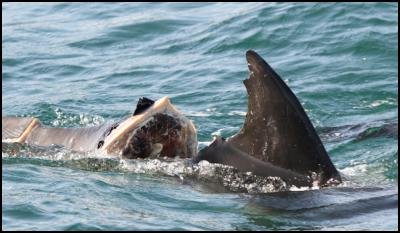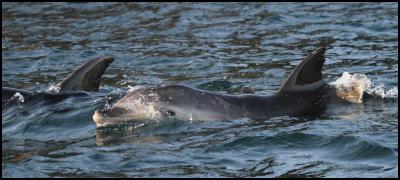Badly injured dolphin prompts DOC warning to boaties
Media release
25 September 2012
Badly injured dolphin prompts DOC warning to boaties
A bottlenose dolphin has been
badly injured after being struck by a boat near Great
Barrier Island in the Hauraki Gulf Marine Park. 
Dwyer wound close up
The
injured dolphin has a large wound behind its dorsal fin and
was observed swimming alongside another bottlenose dolphin
believed to be one of its parents. The large wound and two
smaller lacerations on the tail are consistent with
propeller strike injuries. 
Dwyer head visible
It was sighted at Blind Bay on Great Barrier Island by Sarah Dwyer, a PhD student at Massey University’s Coastal-Marine Research Group. She photographed the injured dolphin last week while undertaking systematic surveys for marine mammals in the Hauraki Gulf as part of a four year study.
Sarah Dwyer says the injured dolphin and its companion moved more slowly than the other dolphins in the group of more than 50 individuals and she was surprised by the distances it could swim given the severity of its injuries.
The pair are regular visitors to Great Barrier Island and the inner Hauraki Gulf. They’ve been seen on several occasions since May 2010, always together. The injured dolphin was previously sighted four weeks ago, fit and well off Whangaparapara on Great Barrier Island.
Department of Conservation’s Warkworth and Great Barrier Area Manager Tim Brandenburg, says boat operators need to be aware that there are dolphins in the Hauraki Gulf Marine Park throughout the year and they need to take care to avoid hitting them.
“These strikes are avoidable if everyone takes more care on the water. Small and large vessels can cause significant harm to marine mammals. Last summer a common dolphin died as a result of receiving lethal spinal injuries after being struck by a jet ski.”
Tim Brandenburg says research by Massey University and the University of Auckland is providing valuable information about dolphin and whale activity in the Hauraki Gulf Marine Park.
“Through their work, we now know that dolphins and Bryde’s whales that live in the Hauraki Gulf Marine Park are vulnerable to being hit by boats and ships.”
DOC is working with shipping interests, government agencies, scientists, environmentalists and iwi to reduce ship strikes on Bryde’s whales in the Hauraki Gulf Marine Park.
DOC administers the Marine Mammals Protection Act 1978, which provides for the conservation, protection and management of marine mammals. It’s an offence to harass or disturb marine mammals. Breaches of the legislation carry penalties of up to six months imprisonment or fines up to $250,000.
Rules for boaties in the vicinity of dolphins,
whales and other marine mammals, can be found at http://www.doc.govt.nz/publications/conservation/native-animals/marine-mammals/sharing-our-coasts-with-marine-mammals/rules/
-Ends-


 Gordon Campbell: On Why We Can’t Survive Two More Years Of This
Gordon Campbell: On Why We Can’t Survive Two More Years Of This ACT New Zealand: Too Many Kiwis Denied The Chance To Gather With Loved Ones At The End Of Life
ACT New Zealand: Too Many Kiwis Denied The Chance To Gather With Loved Ones At The End Of Life Lady Tureiti Moxon: Honouring Kahurangi Tariana Turia - A Legacy of Courage, Leadership, and Tino Rangatiratanga
Lady Tureiti Moxon: Honouring Kahurangi Tariana Turia - A Legacy of Courage, Leadership, and Tino Rangatiratanga Biosecurity NZ: Biosecurity NZ Investigating And Boosting Trapping After Auckland Fruit Fly Find
Biosecurity NZ: Biosecurity NZ Investigating And Boosting Trapping After Auckland Fruit Fly Find NZ Customs Service: New Year Begins With Customs Arrests For Three Alleged Drug Couriers
NZ Customs Service: New Year Begins With Customs Arrests For Three Alleged Drug Couriers Helen Leahy: Honourable Dr Dame Tariana Turia
Helen Leahy: Honourable Dr Dame Tariana Turia Animal Justice Party: Major Brands Linked To Alleged Widespread Animal Cruelty In New Zealand Wool Industry
Animal Justice Party: Major Brands Linked To Alleged Widespread Animal Cruelty In New Zealand Wool Industry


